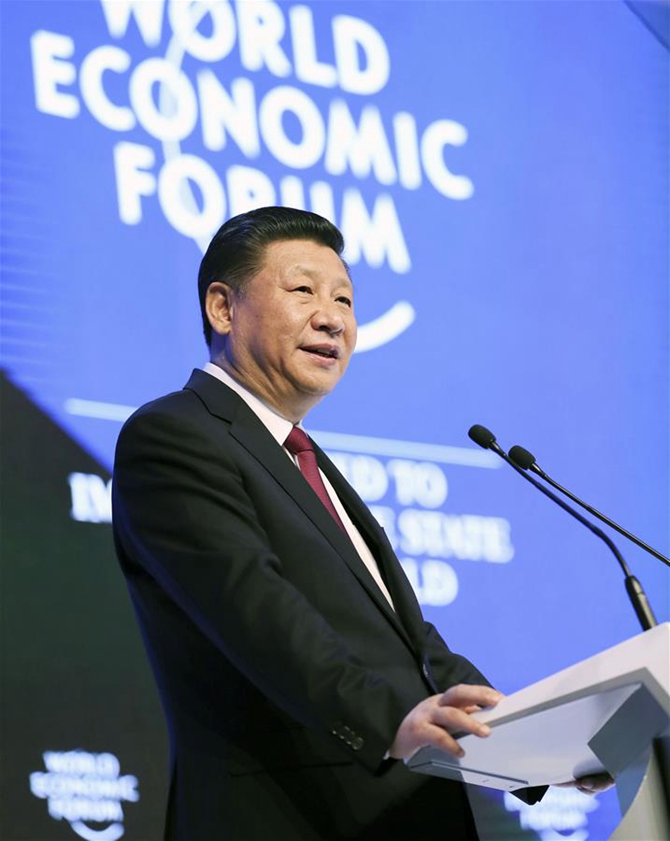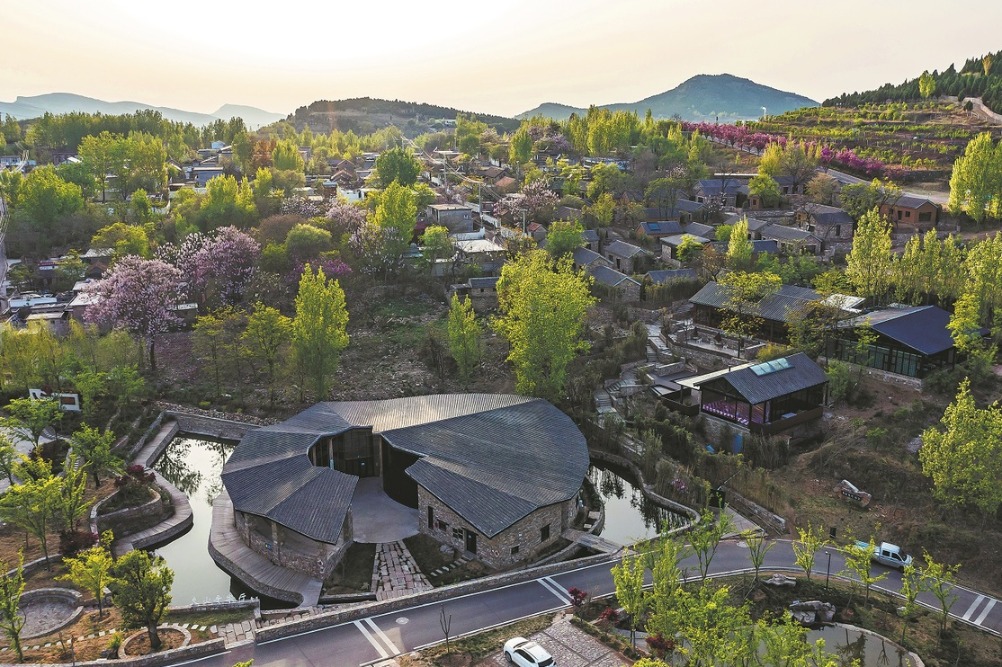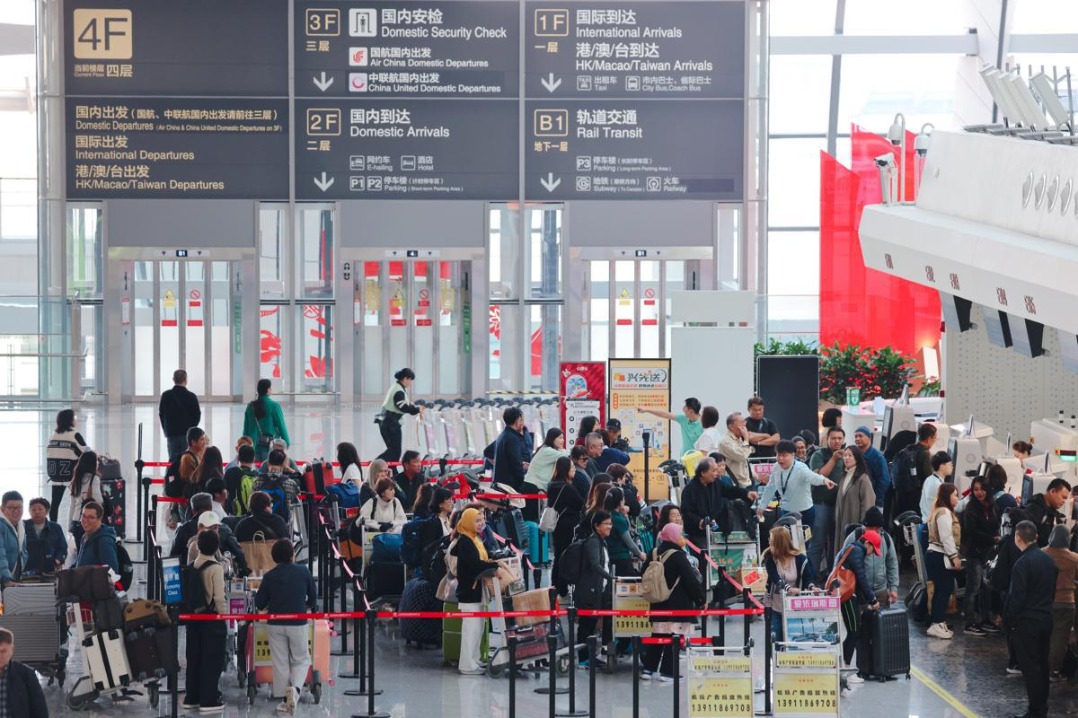Five years on, Xi's words at Davos still resonate

Editor's note: China Daily is publishing a series of stories reviewing President Xi Jinping's visits at home and abroad in the past decade, to showcase his vision for development in China and around the world.

Key points made five years ago by President Xi Jinping at the annual meeting of the World Economic Forum in Davos, Switzerland, remain valid for meeting global challenges today, experts around the world said.
While giving a key speech at the 2017 Davos Forum, Xi made a strong case for advancing globalization and rejecting protectionism. It was the first-ever speech made by a Chinese head of state at Davos.
Klaus Schwab, the founder and chief executive of the World Economic Forum, said after the speech that Xi's presence at the forum was a sign of the shift from a unipolar world dominated by the United States to a more multipolar system, in which rising powers will step up and play a bigger role, according to the Guardian newspaper.
With protectionism and nationalism on the rise in the West, Xi warned against making globalization a scapegoat.
"It is true that economic globalization has created new problems, but this is no justification to write economic globalization off completely," he said. "Rather, we should adapt to and guide economic globalization, cushion its negative impact and deliver its benefits to all countries and all nations.
"Some people blame economic globalization for the chaos in our world," he added. "Economic globalization was once viewed as the treasure cave found by Ali Baba in Arabian Nights, but now it has become Pandora's Box."
He called on countries to cooperate in turbulent times, saying:"World history shows that the road of human civilization has never been a smooth one, and that mankind has made progress by surmounting difficulties. No difficulty, however daunting, will stop mankind from advancing. When encountering difficulties, we should not complain about ourselves, blame others, lose confidence or run away from responsibilities. We should join hands and rise to the challenge. History is created by the brave."
Hailing Xi's speech as a highlight in the history of the World Economic Forum, Schwab told Xinhua News Agency that Xi's "thought-provoking" speech would chart the course of the global economy.
"President Xi delivered a very, very important speech, and it has brought us sunshine at a time when countries are facing common challenges and mounting pressures," Schwab told Xinhua."The world is interconnected, and we are a community with a shared future for mankind. The World Dream and the Chinese Dream can be linked. Let us work together to realize the dream of an innovative, open, fair and inclusive world."
Gavin Wilson, CEO of IFC Asset Management Co, told Xinhua that he found Xi's speech, with its prominent focus on globalization, to be very positive.
"What impressed me most were his expressions on globalization and free trade. Globalization and free trade have brought enormous progress in health, wealth, education, etc," Wilson said after Xi's speech, adding that it was refreshing to hear the leader of the world's second-largest economy reinforce that message.
In his speech, Xi pointed out that "lack of robust driving forces for global growth makes it difficult to sustain the steady growth of the global economy" and said the world should seek "a dynamic, innovation-driven growth model" for global economic development.
Christopher Bovis, a professor of international business law at the University of Hull in the United Kingdom, said: "The 2017 Davos address by the Chinese president resonates in the current economic and political climate. Specifically, the need of promoting and regulating innovation as a driver to economic growth is imperative at current times.
"The recent crises surrounding the global response to the (COVID-19) pandemic and also the response to the energy and food supply disruptions have revealed the unpreparedness of global governance,"Bovis said. Shortcomings are responsible for the resurrection of unilateralism in international relations, which in turn offer a fertile ground for trade disputes and economic isolationism, he added.
Bovis also said that "a set of trends which are worth considering in establishing a fit-for-purpose global governance system is the rethink of energy security and food security. Both energy and food are sectors which are regulatory priorities in post-crisis-era situations. History repeats itself so accurately."
Bernard Dewit, chairman of the Belgian-Chinese Chamber of Commerce, said: "I think what Chinese President Xi suggested five years ago at the Davos conference is still valid. We need to continue with an innovation-driven growth model (that is) more respectful of the environment due to climate change challenges.
"These challenges cannot be coped with by each country separately. Closer cooperation at a world level is indispensable. On the other hand, in order to meet the economic discrepancies and the social-difference challenges at a world level, a model of fair and equitable governance has to be put in place," he added.
John Beirne, vice-chair of research at the think tank Asian Development Bank Institute, said:"President Xi's calls for innovation-driven growth, a coordinated approach and an enhanced framework for global economic governance in 2017 are even more important in the current context.
"Set against post-pandemic recovery efforts amid heightened uncertainty in the outlook due to the Ukraine conflict, it is imperative that world leaders address prevailing global economic challenges in a coordinated manner," he said.
"Recognizing that representation and inclusiveness are important in today's international economic order, so too is consensus-building,"Beirne added. "A challenge for global governance structures will be to ensure sufficient representation while also enabling a framework for workable consensus-building on global economic policy solutions."
Chris Rudd, deputy vice-chancellor and head of the Singapore campus of Australia's James Cook University, said: "Xi's 2017 messages were a characteristic long view which would be difficult to argue with, at the time or in retrospect.
Xi's 2017 statements "remain entirely valid", he added. "It remains evident to objective analysis that economic and societal development lies in openness, cooperation and innovation. The rise of populism in certain countries and the manipulation of truth in mainstream media is a corrosive influence which serves to deny reality. This is a dangerous trend in Western countries which I did not expect to witness in my lifetime."
As emerging markets and developing countries at that time already accounted for 80 percent of the growth of the global economy, Xi said in his 2017 speech that inadequate global economic governance makes it difficult to adapt to new developments in the global economy. He called for developing a model of fair and equitable governance in keeping with the trend of the times.
"There is a growing call from the international community for reforming the global economic governance system, which is a pressing task for us," Xi said. "Only when it adapts to new dynamics in the international economic architecture can the global governance system sustain global growth.
"Countries, big or small, strong or weak, rich or poor, are all equal members of the international community. As such, they are entitled to participate in decision-making, enjoy rights and fulfill obligations on an equal basis. Emerging markets and developing countries deserve greater representation and voice," the president said.
Commenting on Xi's idea of restructuring global governance, Rudd said: "The former colonial powers need to acknowledge their identity shift and in some cases own up to what we would categorize now as war crimes. Individual histories will dictate the path to reconciliation, but these discussions need to progress alongside the parallel change of climate change responsibilities."
Luigi Gambardella, president of ChinaEU, a Brussels-based forum that fosters partnerships between Chinese and European businesses, said: "Few nations can thrive without globalization. Consumers are now suffering from less choice and higher prices due to reduced supply and competition in the international market.
"Our society is now in a transition period of searching for a new way to reproduce itself and promote growth, which creates the uncertainty that nobody knows what the future looks like," he said.
"A real key is to adapt our supply chains and production means to the transforming world and drive the process in the right direction, in order to reduce the risk of disruption of supply chains while continuing to reap the benefits of globalization."
Marcos Troyjo, president of the multilateral New Development Bank, also hailed Xi's commitment to globalization.
Speaking at this year's World Economic Forum in Davos during a session called China Investment and Economic Outlook, Troyjo said:"Welcoming (foreign direct investment) at the levels that China is welcoming right now, and setting up those partnerships-that's openness to globalization. If you have one of the key players in the global economy steady in the course, being open to globalization, I think that is a very positive message to be sent out."
- Unmanned system demonstration island in operation in Suzhou
- Beef up collaboration against global housing crisis
- Developing global AI governance framework highlighted at WLA forum
- China's AI boom sees new wave of applications
- Over 60% of China's population proficient in primary or higher digital skills
- Over 3.41m eligible for China's annual civil servant intake




































